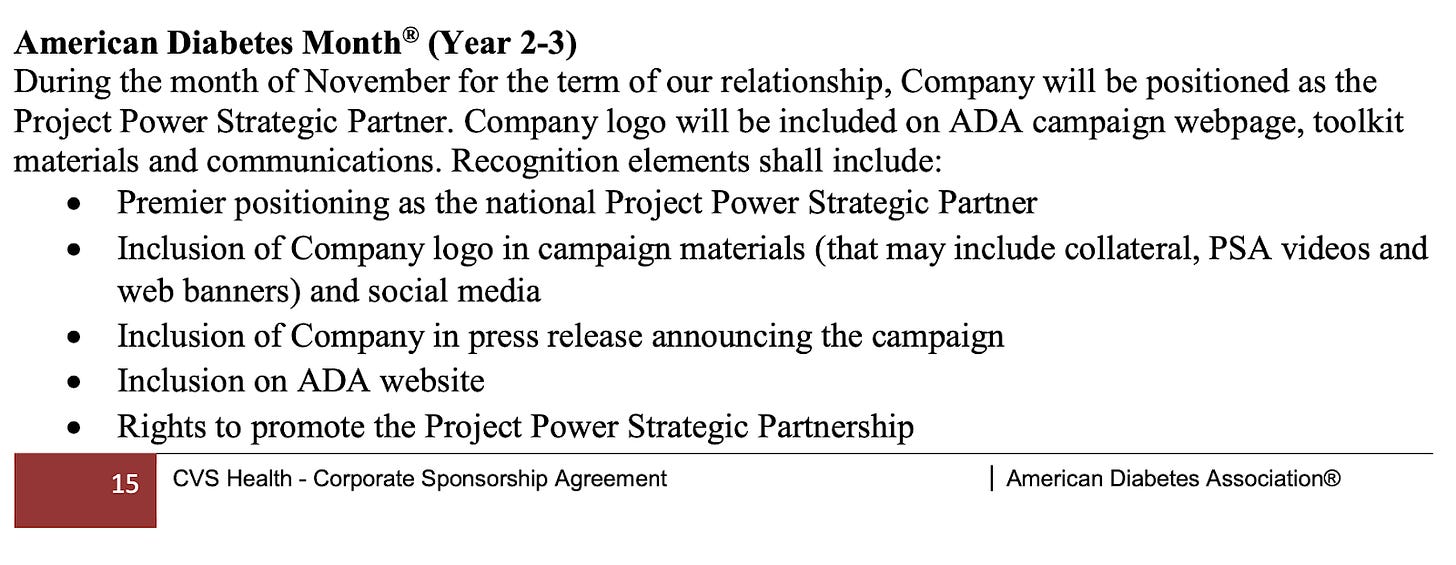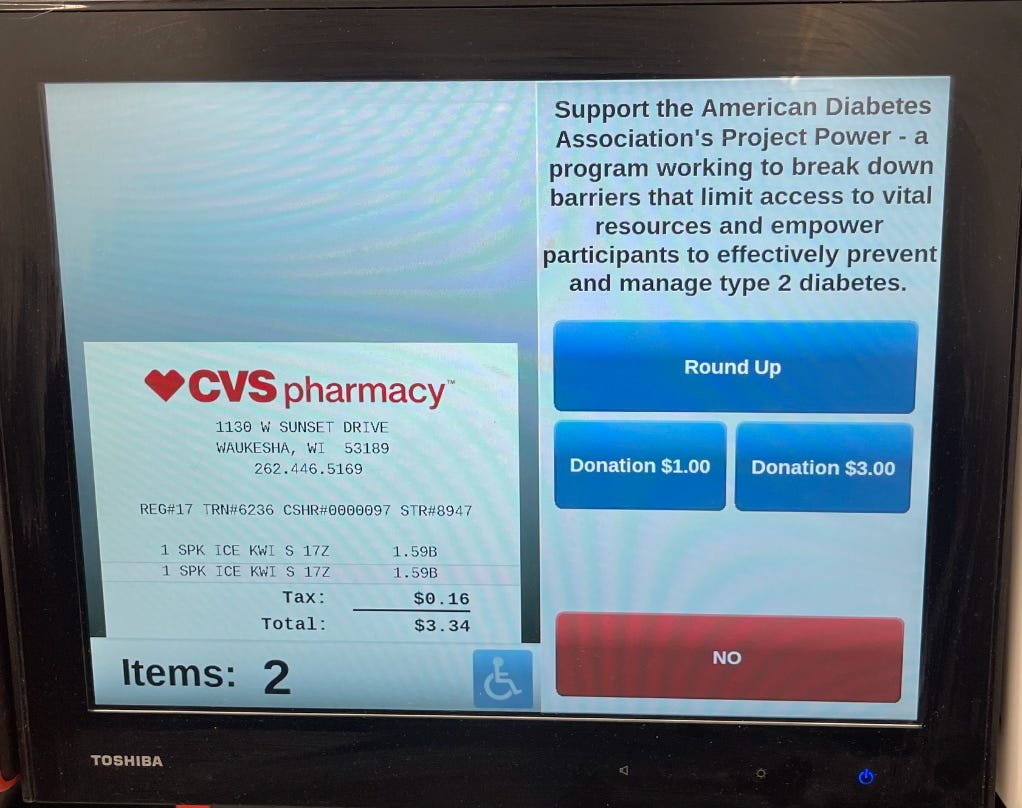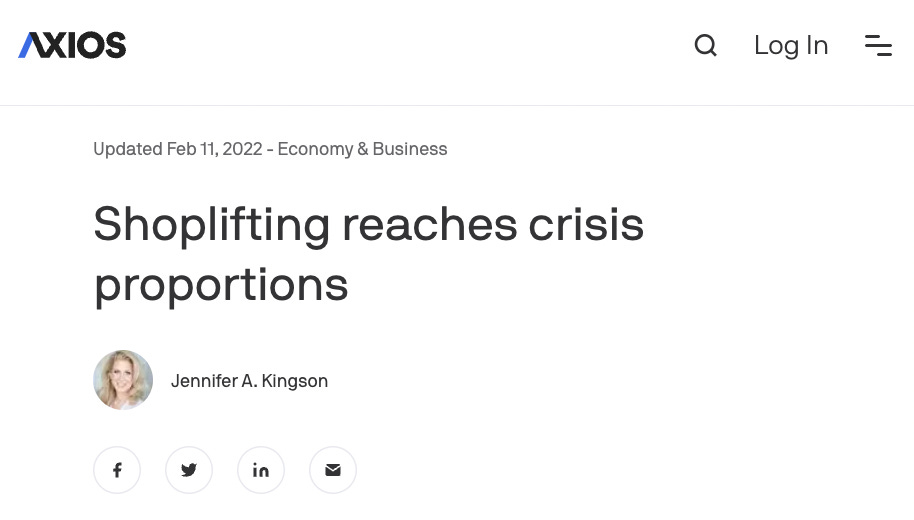CVS' diabetes scheme
On April 13, 2021, CVS, the nation's largest drug store chain, entered into a "Corporate Sponsorship Agreement" with the American Diabetes Association (ADA). Under the terms of the agreement, the ADA agreed "to identify and acknowledge [CVS] as a supporter of the organization and the diabetes cause." Further, the agreement provided CVS with a license "to use the ADA Marks, solely to identify Company as a supporter of the ADA."
The agreement contains numerous pages laying out in detail how the ADA should recognize CVS. For example, the ADA must produce an "integrated marketing campaign… for 4 weeks each year recognizing Company’s support." During American Diabetes Month, CVS "will be included on [the] ADA campaign webpage, toolkit materials and communications."
This agreement has significant commercial value for CVS. People with serious medical conditions like diabetes require a lot of prescription medication and medical supplies. These are lucrative customers for a company like CVS. Associating CVS with the ADA, which is highly regarded among people affected by diabetes, will likely make those people more likely to shop at CVS.
In exchange, CVS agreed to donate at least $10 million to the ADA over three years. CVS is a large corporation with billions in profits and could have simply donated that amount to the ADA. To put it into perspective, since CVS signed the agreement, the company has brought in $395 billion in revenue. $10 million represents 0.002% of CVS' revenue from June 2021 to September 2022.
Instead, the agreement provides a mechanism for CVS to offset its obligation to the ADA "through in-store fundraising and cause marketing." Each year CVS will turn over whatever is donated by customers. Then, at the end of the agreement, CVS will pay "an amount equal to the difference between the total funds raised and $10,000,000."
Initially, CVS was required to turn over any amount in excess of $10 million to the ADA. But, in a last-minute amendment to the agreement, dated October 28, 2021, CVS was permitted to "direct any funds raised in excess of $10,000,000 over the Term of the Agreement to support other initiatives at the Company’s discretion" as long as those initiatives "advance the ADA’s mission."
On November 2, 2021, CVS publicly announced its $10 million commitment to the ADA. "CVS Health has committed $10 million over three years [to the ADA] to support people in preventing and managing diabetes with increased awareness, knowledge, and action to improve health," the press release stated. CVS also mentioned it would solicit donations from customers, but suggested those donations would provide additional support for the ADA:
CVS Health will also host an in-store fundraising campaign at all CVS Pharmacy locations nationwide during American Diabetes Month, now through November 27, to give customers an opportunity to support the ADA and build a future without diabetes.
After CVS customers scanned their merchandise, they were presented with this message, giving them the option to donate various amounts to the ADA.
A customer that tapped "Donation $1.00" likely believed that their choice meant the ADA would have an additional dollar it could use to support its mission. In fact, that dollar simply reduced CVS' obligation to the ADA at the conclusion of their corporate sponsorship agreement. Rather than supporting the ADA, the customer was subsidizing CVS' operations.
CVS did not respond to Popular Information's request for comment.
CVS' legal troubles begin
In May 2022, Kevin McCabe — a CVS customer who believed he donated to the ADA at checkout — filed a class action lawsuit against the company. McCabe alleges that CVS "defrauded its customers" by representing that donations would benefit the ADA when the donations actually benefit CVS.
The lawsuit, which was amended in September 2022, asserts that the checkout message about the ADA donations was "false, deceptive, and misleading" and "the Checkout Message was material and was the only disclosure that CVS made to Customers regarding the Campaign." The lawsuit also claims that "CVS issued false, deceptive, and misleading receipts to Customers who made a Campaign Donation" because the receipts said customer donations are "100% tax deductible." The lawsuit alleges that monies that reduced CVS' existing obligations to the ADA are not tax deductible.
On November 11, 2022, CVS filed a motion to dismiss the complaint. CVS' motion to dismiss does not dispute the terms of the agreement with the ADA. Rather, it describes them in a slightly more favorable light:
CVS agreed to fundraise from its customers and turn over the donations to the ADA. CVS further promised that at the conclusion of three-plus years of fundraising, CVS would (if necessary) make up the difference between the cumulative customer donations and $10 million. Obviously, upon signing, CVS did not assume an unconditional $10 million debt to the ADA.
This, of course, was not the story told to customers. CVS customers were not told that their donations would offset CVS' $10 million obligation to the ADA at the conclusion of the agreement. Nor did they know that CVS agreed to that obligation in exchange for the use of ADA marks and promotion by the ADA.
CVS focuses on whether its conduct meets the technical legal definitions of fraud. Specifically, CVS' attorneys insist that CVS had "no debt" to the ADA and, therefore, its customers could not have been tricked into paying its debt. CVS instead describes the agreement as an "obligation" to the ADA, which "is conditional, and does not arise unless there is a Potential Shortfall." Whether there is a shortfall "cannot be determined until December 31, 2023, at the earliest; and even then, the agreement gives CVS four additional months to solicit additional donations to cover the Potential Shortfall." The motion to dismiss says that "alleged failure to disclose an obligation to donate that does not currently exist – and likely may never exist – cannot sustain a claim for fraud."
Whether or not this defense holds up in court is uncertain. CVS' motion to dismiss, and the plaintiff's opposition to that motion, is currently under consideration by the court. But, without a doubt, many CVS customers believe they were providing additional dollars to the ADA that the organization otherwise would not receive. That isn't true.
What counts as news
The lawsuit alleges that CVS customers may have been defrauded out of millions of dollars. But the case has received scant coverage. A couple of legal trade publications covered the case after it was first filed in May. More recently, a few general interest publications picked up the story after it was highlighted in a viral tweet.
But most major outlets have a strong bias towards amplifying so-called property crimes committed by regular people instead of corporate misconduct. Companies like CVS are typically presented as victims, not perpetrators.
Two weeks ago, for example, the Boston Globe published a story on how retailers like CVS are locking up everyday products like deodorant, stating that it was a “testament to a rise in theft.” In the piece, the author notes that CVS had experienced “a 300 percent increase in retail theft since the start of the pandemic.". Prior to this, the Globe ran a story on increased police presence in a part of Boston, where they feature an expert who claims that “the only crime that's up this year [in Boston] is retail theft.”
And the Globe isn’t the only one. Other major outlets are also providing extensive coverage on retail theft. In the last six months, the Philadelphia Inquirer published a piece on how “retail theft is on the rise” and cited CVS Health’s director of organized retail crime and corporate investigations on how “retail theft at CVS stores had tripled since the pandemic began;” NBCNews ran a story on how retailers like CVS employ investigators to secretly follow people they suspect are “part of a shoplifting enterprise;” and ABC wrote a story about a man, who was formerly accused of stealing from Walgreens, shoplifting at CVS. Police claim they "can document up to $15,000 worth of items being stolen."
Axios, citing a CVS spokesman, declared shoplifting a "crisis."
The volume of news reports on retail theft, however, isn't justified by the data. According to the FBI’s crime data explorer, the number of reported shoplifting offenses dropped 46 percent between 2019 and 2021.
“This contradictory data hasn’t stopped big retail chains and their law enforcement allies from pushing the theft-surge narrative,” The Appeal wrote last year. “Stories about shoplifting are generally sourced from major retailers themselves.”





I especially appreciated the light you shine on stories like this, which most media neglect.
I was not aware of this lawsuit - thanks for the information. What this brought to my mind -- perhaps unfairly -- is the relationship between AARP and insurance companies.